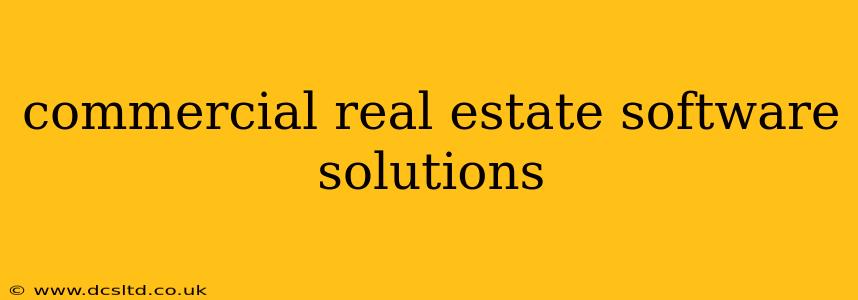The commercial real estate (CRE) industry is dynamic and complex, demanding efficient management of properties, tenants, and finances. To stay competitive, CRE professionals rely on powerful software solutions to streamline operations and improve decision-making. This comprehensive guide explores the diverse range of commercial real estate software solutions available, highlighting their key features and benefits. We'll delve into various aspects, answering common questions and providing insights into choosing the right software for your specific needs.
What are the different types of commercial real estate software?
The market offers a variety of software tailored to different CRE functions. These can broadly be categorized as:
-
Property Management Software: This is the cornerstone for many CRE businesses, handling tasks like rent collection, lease management, tenant communication, maintenance requests, and financial reporting. Features often include online payment portals, automated rent reminders, and detailed financial dashboards.
-
Investment Management Software: For those involved in CRE investment, this type of software focuses on portfolio tracking, deal analysis, financial modeling, and performance reporting. It helps in evaluating investment opportunities, monitoring returns, and making informed investment decisions.
-
CRM (Customer Relationship Management) Software: Building and maintaining strong relationships with clients is crucial. CRE CRM software helps manage leads, track interactions, and nurture relationships throughout the sales cycle, from initial contact to lease renewals.
-
Deal Management Software: Streamlining the entire deal process, from sourcing to closing, is crucial for efficiency. These solutions often include tools for due diligence, document management, and collaboration between stakeholders.
-
Market Research & Analytics Software: Understanding market trends and property values is key for strategic decision-making. This type of software provides insights into market data, comparable sales, and property valuations.
What are the key features of commercial real estate software?
Essential features vary depending on the software type, but some common functionalities include:
- Tenant Management: Managing tenant information, lease agreements, and communication.
- Financial Management: Tracking income and expenses, generating financial reports, and managing budgets.
- Lease Management: Managing lease agreements, rent payments, and renewals.
- Property Management: Handling maintenance requests, inspections, and repairs.
- Reporting & Analytics: Generating reports on key performance indicators (KPIs) and analyzing data for better decision-making.
- Document Management: Storing and organizing important documents, ensuring easy access and version control.
- Integration with other systems: Seamless integration with accounting software, CRM systems, and other relevant platforms.
How can commercial real estate software improve efficiency?
Implementing the right CRE software can drastically improve efficiency in numerous ways:
- Automation: Automating tasks like rent collection, lease renewals, and reporting saves time and reduces manual errors.
- Centralized Data: Having all important data in one central location improves accessibility and collaboration.
- Improved Communication: Streamlined communication with tenants and stakeholders enhances responsiveness and minimizes misunderstandings.
- Data-Driven Decision-Making: Access to comprehensive data and analytics allows for informed decisions based on facts and trends.
- Reduced Costs: Automation and improved efficiency lead to reduced operational costs.
What are the benefits of using commercial real estate software?
The benefits extend beyond increased efficiency:
- Enhanced Tenant Relationships: Improved communication and service lead to happier tenants and higher tenant retention rates.
- Better Investment Decisions: Data-driven insights improve investment selection and risk management.
- Increased Revenue: Optimized operations and improved efficiency lead to increased profitability.
- Competitive Advantage: Modernizing operations with robust software provides a competitive edge in the market.
- Scalability: Many solutions offer scalability, allowing your business to grow without significant software limitations.
What factors should I consider when choosing commercial real estate software?
Choosing the right software involves careful consideration of several factors:
- Your specific needs: Identify the key functionalities required based on your business size and operations.
- Budget: Software pricing models vary widely, from subscription-based to one-time purchases.
- Integration capabilities: Ensure the software integrates seamlessly with your existing systems.
- User-friendliness: The software should be intuitive and easy for your team to learn and use.
- Scalability: Consider future growth and choose a solution that can adapt to your changing needs.
- Vendor reputation and support: Choose a reputable vendor with a strong track record and responsive customer support.
How much does commercial real estate software cost?
The cost of commercial real estate software varies considerably depending on the features, the number of users, and the vendor. Pricing models can range from a few hundred dollars per month to thousands of dollars per year. It's crucial to request detailed pricing information and compare options before making a decision.
This guide offers a comprehensive overview of commercial real estate software solutions. Remember that careful research and consideration of your specific needs are vital to selecting the most effective software for your business. By leveraging these technological advancements, CRE professionals can optimize their operations, enhance decision-making, and thrive in the competitive real estate market.
